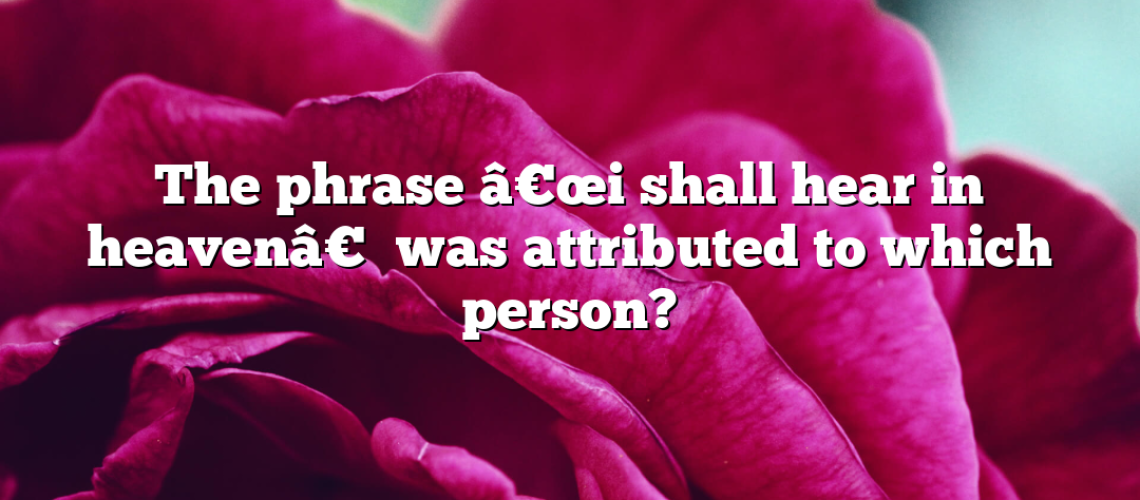The phrase “i shall hear in heaven†was attributed to which person?
The phrase “I shall hear in heaven” carries a weight of contemplation and spiritual resonance, yet its origin remains veiled in mystery. Through the annals of history, various individuals have been attributed with uttering these words, each context offering a unique lens into its significance. In unraveling this enigma, we delve into the depths of time to shed light on the genesis of this profound sentiment.
Table of Contents
ToggleTracing the Threads of History
Early Notions of Immortality
To comprehend the roots of “I shall hear in heaven,” we embark on a journey through epochs where the concept of an afterlife held profound significance. Ancient civilizations, such as the Egyptians and Mesopotamians, envisioned an existence beyond mortality, where the soul transcended earthly confines. In the whisper of wind and rustle of leaves, they perceived echoes of departed souls, igniting a belief in a realm where voices could still be heard.
Biblical Echoes
The Bible, a cornerstone of Western literature and theology, offers fertile ground in our quest for the origin of these words. Psalms, Proverbs, and the teachings of Jesus Christ resound with promises of eternal life and communion with the divine. Scholars scrutinize verses, seeking the elusive phrase that encapsulates the essence of “I shall hear in heaven,” drawing connections across Old and New Testament passages.
Literary Echoes: Shakespeare and Beyond
William Shakespeare, the Bard of Avon, imbued his works with timeless truths and existential ponderings. In plays like “Hamlet” and “King Lear,” characters grapple with mortality, contemplating the mysteries of existence and the possibility of an afterlife where voices linger. While the exact phrasing may not be found in Shakespeare’s repertoire, echoes of the sentiment reverberate through his eloquent prose.
Musical Reverberations
The realm of music, a medium that transcends linguistic barriers, has also echoed the sentiment of “I shall hear in heaven.” From classical compositions to contemporary ballads, composers and lyricists have woven themes of transcendence and reunion into their melodic tapestries. Through symphonies, hymns, and heartfelt refrains, the yearning to hear once more in heavenly realms finds expression.
Exploring Interpretations and Context
Spiritual Traditions: Saints and Sages
Within the annals of religious history, saints and spiritual luminaries have articulated sentiments akin to “I shall hear in heaven.” From the mystical utterances of Rumi to the devotional poetry of Saint Teresa of Ávila, echoes of longing for celestial communion permeate sacred texts and spiritual treatises. These voices, steeped in piety and divine yearning, offer glimpses into the depths of faith and the longing for eternal reunion.
Philosophical Musings: Existential Echoes
Existential philosophers, grappling with the complexities of human existence, have also explored themes resonant with “I shall hear in heaven.” From Søren Kierkegaard’s leap of faith to Friedrich Nietzsche’s exploration of eternal recurrence, philosophical inquiries intersect with spiritual contemplations, offering diverse perspectives on the quest for transcendence and the hope of hearing beyond mortal realms.
Unveiling the Source: A Quest for Truth
Historical Documentation: Fact or Fiction?
As we sift through historical records and literary archives, the quest for the origin of “I shall hear in heaven” faces myriad challenges. Documented evidence may elude us, obscured by the passage of time and the vagaries of oral tradition. Yet, within the fragments of manuscripts and the echoes of oral lore, lies the potential to uncover the elusive source of this profound utterance.
Contextual Analysis: Beyond the Words
In our pursuit of truth, contextual analysis emerges as a crucial tool. By examining the socio-cultural milieu and personal narratives of purported speakers, we gain insights into the circumstances that may have prompted the utterance of “I shall hear in heaven.” Whether uttered in moments of despair or transcendental ecstasy, the significance of these words transcends mere linguistic inquiry, delving into the depths of human experience.
Conclusion: Echoes Across Eternity
In our quest to unravel the enigma of “I shall hear in heaven,” we traverse realms of history, literature, and spirituality, seeking the elusive source of this profound sentiment. From ancient civilizations to modern-day musings, echoes of longing for celestial communion reverberate across time and space, transcending linguistic barriers and cultural divides. While the origin of these words may remain shrouded in mystery, their resonance endures, offering solace and hope to all who ponder the mysteries of existence and the promise of eternal reunion.


